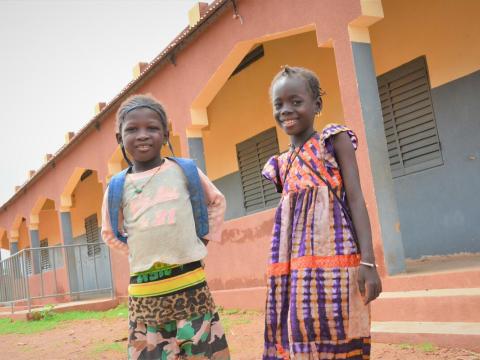Hunger in Mali: “I did not used to like staying here, because granny did not have food to feed my sister and me.”

What do you think of when you think of the work of World Vision?
A person in an orange shirt throwing bags of rice from a truck? Or a doctor holding an underweight baby? Maybe you think of full bellies and smiling faces.
The reality is far more nuanced – and complex. You only have to look at eight year old Aichata, who's fighting hunger in Mali, to realise that responding to a hunger crisis is about so much more than providing food.
During this time of extreme global upheaval, the complex relationship between COVID-19, a changing climate and escalating conflict, means that children like Aichata are forced to face crisis after crisis with no reprieve. For this reason, World Vision’s response has to be centered around building resilience and helping communities become self-sufficient.
For Aichata, her battle with hunger in Mali began four years ago, when she and her sister had to move in with their grandmother because their parents could no longer support them.

“When my parents told us that we were going to live with our granny, I was very happy,” says Aichata.
But things deteriorated quickly. “When I first moved here, my parents sent us a bag of millet every month. But after some time it stopped. After that we used to go to bed starving.”
Aichata’s grandmother, Guessa, feels awful that the girls were forced to endure this. “Before the ongoing instability, I would farm, collect and sell firewood and charcoal, which allowed me to take good care of the girls,” she explains. “Today, it’s very difficult for me to make ends meet.”
World Vision has been working in Mali for decades, but the situation is now at its most extreme. The impact of conflict, COVID-19 and the changing climate over the last two years has pushed the goal of achieving zero hunger further out of reach… and pushed millions more children to the edge of starvation.
Aichata knows that feeling of hunger well. “I did not used to like staying here, because granny did not have food to feed my sister and me,” she says.
Right now, 2.16 million children in Mali, just like Aichata, are in desperate need of humanitarian support.
And they don’t just need food and water. They need security, safe places to learn and communities that can help them grow. They need hope and a chance.
For Aichata, that hope came in the form of World Vision’s Resilience and Cash Transfer Program. A hand up rather than a hand out that enabled Aichata’s grandmother to put food on the table while also getting the girls back into school with the purchase of school supplies.

Today, Aichata has some renewed hope for the future.
“I desire to become a teacher when I grow up,” she says. "I wish my sister and I will succeed at school to have money that will allow us to eat nice food and help other people like us when we grow up.”
Right now more than 45 million people are one step away from starvation. Urgent life-saving action is needed to prevent a hunger crisis that could kill tens of thousands of children.
#HungerinMali2022 #Conflict #PovertyinMali #Mali
Hunger is complex, but donating is easy.